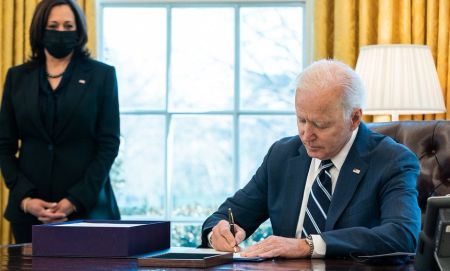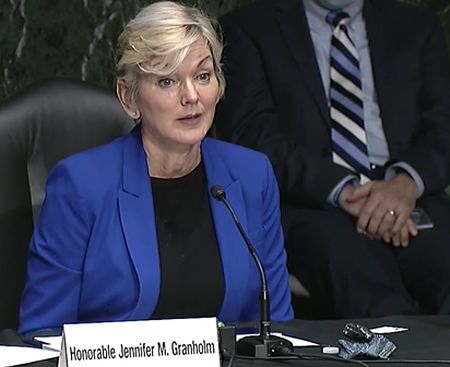Biden's 'strategic' oil release isn't just misguided – It's illegal
By Mark R. Robeck
WASHINGTON, D.C. (Texas Insider Report) — While consumers are understandably distressed about the rapidly increasing prices of crude oil and gas prices at the pump, those escalating prices are not due to a severe supply interruption. The most significant cause is President Joe Biden’s policies related to the Oil & Gas Industry. These began on his first day in office, when he unilaterally canceled the permits for the partially constructed Keystone XL Pipeline.
And now Mr. Biden has announced he will release 180 million barrels of crude oil from the Strategic Petroleum Reserve (commonly referred to as the SPRO,) over six months
 This is unlawful, and harms our National Security.
This is unlawful, and harms our National Security.
 This is unlawful, and harms our National Security.
This is unlawful, and harms our National Security.After the 1973 Arab Oil Embargo, Congress passed the 1975 Energy Policy & Conservation Act (EPCA) creating the SPR to provide reserve supplies of crude oil to counter “severe energy supply disruptions.” And, concerns regarding the potential for the federal government to manipulate normal market functions prompted Congress to limit the circumstances when SPR crude oil could be released.
The EPCA authorizes the Secretary of Energy to release oil reserves only when there are:
- Emergency Shortages caused by a severe interruption of imported or domestic supply,
- An act of Sabotage or Terrorism, or
- An “act of God” such as a hurricane.
Unlike the 2011 Libyan Civil War, Russia’s invasion of Ukraine has not caused a disruption of supplies in world markets.
In fact, the U.S. and European Union's sanctions on Russia expressly exempt Russia’s sales of oil.
In fact, the U.S. and European Union's sanctions on Russia expressly exempt Russia’s sales of oil.
Even the sanctions on Russian banks’ use of the SWIFT International Transaction System exclude energy sales.
Yes, recent crude oil price increases are partly due to reduced production in response to the economic slowdown from the COVID-19 pandemic. But more importantly, that was followed by Mr. Biden's:
- Suspension of New Lease Sales;
- Removal of highly productive Offshore Tracts and the Arctic National Wildlife Refuge (ANWR) from future lease sales;
- Imposition of New & Expensive environmental regulatory requirements for Drilling Permits, Roads, and Pipelines; and
- Proposed restrictions on capital investments in Oil & Gas Projects.
 The cumulative effect of Mr. Biden’s fossil fuel policies has been to discourage the immense capital investment required to drill even one new well.
The cumulative effect of Mr. Biden’s fossil fuel policies has been to discourage the immense capital investment required to drill even one new well.But the industry’s response to the administration’s hostility is not an emergency disruption of supply. It is exactly the response that a rational industry would make and the response the administration intended: less investment in new development, leading to less production.
Similarly, the decision to prohibit any U.S. purchases of crude oil from Russia is not a severe supply disruption.
U.S. imports of Russian crude oil amount to less than 5% of consumption – but even if it were more the supply was not stopped by the war in Ukraine. It was stopped by U.S. sanctions, and Russia continues selling crude oil around the world today, including to its largest customers: China, India, and the EU.
In short, Congress imposed a predicate circumstance of a “severe energy supply disruption” for the president and the Secretary of Energy (currently Jennifer Granholm, below right,) to authorize the sale of crude oil from the SPR – and such a disruption simply does not exist right now.
U.S. imports of Russian crude oil amount to less than 5% of consumption – but even if it were more the supply was not stopped by the war in Ukraine. It was stopped by U.S. sanctions, and Russia continues selling crude oil around the world today, including to its largest customers: China, India, and the EU.
In short, Congress imposed a predicate circumstance of a “severe energy supply disruption” for the president and the Secretary of Energy (currently Jennifer Granholm, below right,) to authorize the sale of crude oil from the SPR – and such a disruption simply does not exist right now.
The unlawful release of oil from the SPR threatens national security by depleting the SPR absent a true supply disruption.
 For example, if Iran decides the time is right to pursue a show of force in the Middle East and attack Saudi Arabia, we could face an actual worldwide disruption of supply with a depleted reserve of crude oil in the SPR.
For example, if Iran decides the time is right to pursue a show of force in the Middle East and attack Saudi Arabia, we could face an actual worldwide disruption of supply with a depleted reserve of crude oil in the SPR.Similarly, if a Category 5 hurricane hits the Gulf of Mexico and shuts down oil production for weeks, as with Hurricane Katrina, the SPR may not be able to respond to the actual emergency.
Biden’s energy policies contributed to high prices well before Russia invaded Ukraine.
The release from the nation's Strategic Petroleum Reserve is unlawful – and increases the risk to our national security.
Mark R. Robeck is the former Deputy General Counsel for Energy Policy with the U.S. Department of Energy.
























